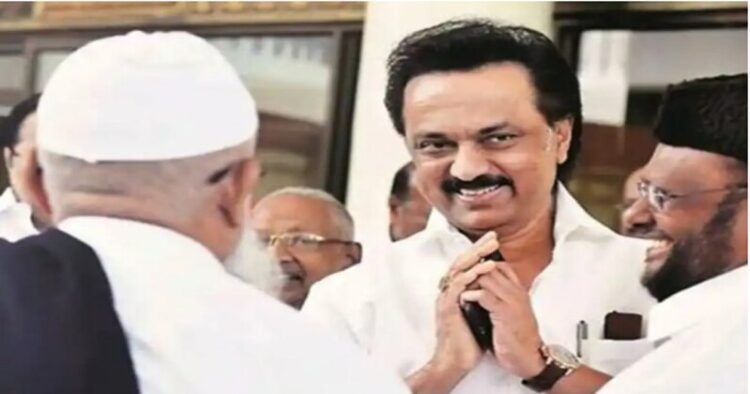In a controversial move that raises concerns about potential religious conversions and perceived appeasement, the DMK government in Tamil Nadu has issued a Government Order (GO) reclassifying individuals from backward, most backward, and Adi Dravidian communities who convert to Islam as part of the Muslim backward class. The move facilitates the issuance of caste certificates, enabling them to avail 3.5 per cent reservation benefits.
This decision has ignited a political and social debate, with critics expressing fears that such a move could incentivize religious conversions, particularly from Hinduism to Abrahamic religions. The DMK government’s decision is viewed by some as part of an ongoing strategy to appease minority communities, specifically Muslims, by providing them with reservation benefits.
In Tamil Nadu’s political landscape, both the AIADMK and DMK have been actively engaging in competitive politics to cater to the demands and expectations of minority communities. The AIADMK, which recently severed ties with the NDA, has been accused of aligning with the Social Democratic Party of India (SDPI) and Christian outfits. While the AIADMK initially supported the Citizenship Amendment Act (CAA) in Parliament, it later shifted its stance, voicing opposition in the state Assembly and aligning itself with anti-CAA sentiments.
The DMK, on the other hand, has taken steps perceived as favorable to Christian and Muslim communities. The government’s decision to issue caste certificates for converted Muslims is seen as a departure from existing norms and an indication of the party’s inclination towards minority appeasement.
Notably, the DMK government has faced criticism for its handling of various issues related to religious communities. The government’s refusal to permit events marking the prana pratistha on January 22, despite court directives to allow them unhindered, and its adoption of a resolution urging the Centre to provide reservation benefits to converted SC/ST individuals to Christianity have drawn scrutiny.
While the DMK government has not allowed the issuance of caste or income certificates for the economically weaker sections (EWS) among upper-class communities, it has made exceptions for Muslims, raising questions about preferential treatment.
The move also comes amid other decisions by the DMK government that have stirred controversy, including the approval to allocate 7,040 tons of raw rice worth Rs. 26.81 crore to mosques for preparing Ramadan porridge. Critics argue that such allocations, funded by taxpayers, raise questions about equity and fairness, especially when compared to contributions from Hindu temples that generate revenue.
The controversy surrounding the reservation benefits for converted individuals is not new, as debates have unfolded over the years regarding the extension of such benefits to individuals converting to religions other than Hinduism. According to a statement by then-Union Law Minister Ravi Shankar Prasad in 2021, Hindu individuals eligible for reservation benefits, such as those belonging to Scheduled Castes, lose these benefits if they convert to Christianity or Islam. The Constitution’s Article 3 specifies that those professing a religion other than Hindu, Sikh, or Buddhist shall not be considered Scheduled Caste members.
The issue of reservation benefits has historical roots, with the Nehru government passing an order in 1950 restricting the definition of “scheduled caste” only to members of the Hindu faith. This restriction was later extended to Sikhs in 1956 and Buddhists in 1990. The Constitution (Scheduled Castes) Order’s Para 3 explicitly states that individuals professing a religion different from Hindu, Sikh, or Buddhist religion shall not be deemed members of a Scheduled Caste. A Supreme Court ruling in 2015 emphasised that once a person ceases to be a Hindu and becomes a Christian, the social and economic disabilities arising from Hindu religion cease, leading to the exclusion from scheduled caste status.
The Tamil Nadu government’s recent move adds to the ongoing debate about the extension of reservation benefits to converted individuals. In 2020, the Andhra Pradesh government issued a Government Order (GO) extending Scheduled Caste benefits to converted Christians, leading to discussions on the rationale and implications of such decisions.



















Comments